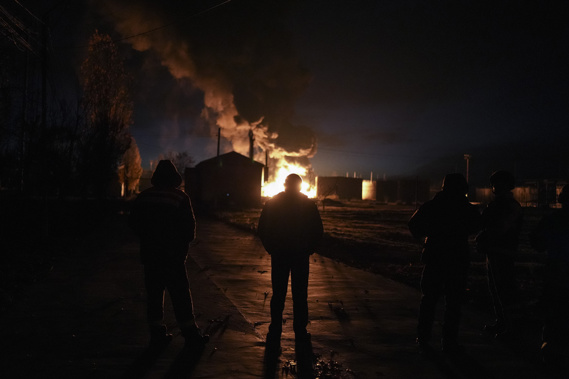
KYIV, Ukraine (AP) — Powerful explosions from shelling shook Ukraine's Zaporizhzhia region, the site of Europe's largest nuclear power plant, the global nuclear watchdog said Sunday, calling for "urgent measures to help prevent a nuclear accident" in the Russian-occupied facility.
Rafael Mariano Grossi, the director general of the International Atomic Energy Agency, said multiple explosions near the plant — on Saturday evening and again on Sunday morning — abruptly ended a period of relative calm around the nuclear facility that has been the site of fighting between Russian and Ukrainian forces since Russia invaded on Feb. 24.
The fighting has raised the specter of a nuclear catastrophe ever since Russian troops occupied the plant during the early days of the war.
In renewed shelling both close to and at the site, IAEA experts at the Zaporizhzhia facility reported hearing more than a dozen blasts within a short period Sunday morning and could see some explosions from their windows, the agency said.
Several buildings, systems and equipment at the power plant — none critical for the plant's nuclear safety — were damaged, the IAEA said, citing plant management.
Still, Grossi called reports of the shelling "extremely disturbing," and appealed to both sides to urgently implement a nuclear safety and security zone around the facility.
"Whoever is behind this, it must stop immediately," he said. "As I have said many times before, you're playing with fire!"
Russia has been pounding Ukraine's power grid and other infrastructure from the air, causing widespread blackouts for millions of Ukrainians amid frigid weather. That has left Ukrainians without heat, power or water as snow blankets the capital, Kyiv, and other cities.
Ukraine's state nuclear power operator said Russian forces were behind the shelling of the Zaporizhzhia plant. Energoatom said Sunday that the targeted equipment there was consistent with the Kremlin's intent "to damage or destroy as much of Ukraine's energy infrastructure as possible" as winter sets in.
The weekend strikes damaged the system that would enable power units 5 and 6 to start producing electricity again for Ukraine, the power operator said. It listed chemical desalinated water storage tanks and a steam generator purge system as being damaged Sunday, although the full extent of the damage was still being assessed.
- Putin crosses a red line with China
- Initial findings suggest missile that hit Poland was fired by Ukrainian forces at Russian missile: US officials
- 'Crisis situation': Russian missiles hit Nato-member Poland, killing two
The State Nuclear Regulatory Inspectorate of Ukraine decided to bring the two units to a minimally controlled power level to obtain steam, which is critical in winter for ensuring the safety of the plant and surrounding areas, Energoatom said.
Moscow, however, blamed Ukrainian forces. Russian Defense Ministry spokesman Igor Konashenkov accused the Ukrainians of shelling the power plant twice on Sunday. He also said two shells hit near power lines supplying the plant with electricity.
Elsewhere in the Zaporizhzhia region, Russian forces shelled civilian infrastructure in about a dozen communities, destroying 30 homes, Ukrainian President Volodymyr Zelenskyy's office said Sunday. Twenty buildings were damaged in shelling at Nikopol, a city across the river from the Zaporizhzhia plant, the report said.
Three districts in the northern Kharkiv region — Kupyansk, Chuguiv and Izyum — also came under Russian artillery fire. And in the eastern Luhansk and Donetsk regions, Russian shelling killed one person in Donetsk and damaged power lines, it said.
The situation in the southern Kherson region "remains difficult," the president's office said, citing Ukraine's armed forces. Russian forces fired tank shells, rockets and other artillery on the city of Kherson and several nearby settlements that were recently liberated by Ukrainian forces.
Shelling late Saturday struck an oil depot in Kherson, igniting a huge fire that sent billowing smoke into the air. Russian troops also shelled people lining up to get bread in Bilozerka, a town in the Kherson region, wounding five, the report said.
In the city of Kherson — which still has little power, heat or water — more than 80 tons of humanitarian aid have been sent, said local administrator Yaroslav Yanushevych, including a UNICEF shipment of 1,500 winter outfits for children, two 35-40-kilowatt generators and drinking water.
Also on Sunday, a funeral was held in eastern Poland for the second of two men killed in a missile explosion Tuesday. The other man was buried Saturday. Poland and the head of NATO have both said the missile strike appeared to be unintentional, and was probably launched by Ukraine as it tried to shoot down Russia missiles or drones.
___
-JOHN LEICESTER and HANNA ARHIROVA, Associated Press
Kirsten Grieshaber in Berlin contributed.
Take your Radio, Podcasts and Music with you









